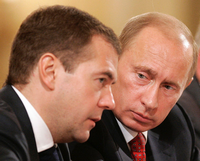Russian President Dmitry Medvedev's announcement last Saturday that he would not stand for re-election, instead nominating his predecessor and current prime minister, Vladimir Putin, to once again assume the office, came as a surprise to those of us who were expecting a continuation of the Medvedev-Putin tandem. At the same time, however, the somewhat trite and simplistic analysis being proferred by those who argue that Medvedev was nothing more than a seat-warmer for Putin until the latter could reclaim the presidency is not particularly helpful in understanding the direction Russian politics has taken -- and will take.
If Putin had wanted to continue as president, he did not need to set up a convoluted, complicated scheme like the tandem. In 2007, there was already overwhelming support in Russia both for removing the consecutive-term limit and for Putin to run again in 2008. Putin's careful management of the December 2007 elections to the State Duma produced a supermajority for the Kremlin-compliant United Russia party, which could have easily amended the constitution and changed the electoral rules to facilitate a third term for Putin. Even if there was no desire to change the constitution, Medvedev could simply have resigned the presidency in 2009 or 2010, which would have made Putin, as prime minister, the acting president.
But after Medvedev took office in 2008, Putin did not act as if he was simply waiting for an inevitable return to the Kremlin, nor did he assume that Medvedev would passively implement his directives. Instead, he had the Duma vote to expand the powers and portfolio of the prime minister, including new authorities over foreign and defense policies, which had traditionally been the sole perogative of the president. Putin created a "dual-key" system in which both the president and prime minister would have to agree on policy initiatives, while expanding the reach of the cabinet by creating a series of powerful deputy prime ministers, each of whom were given a different section of the government and economy to supervise. This level of duplication would not have been necessary if Putin expected Medvedev to blindly follow his orders.

